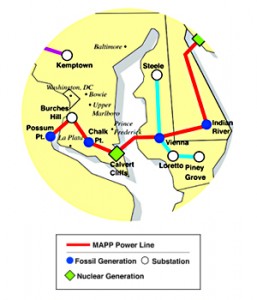Delmarva Power to hold transmission line meetings
January 22nd, 2009
MID-ATLANTIC POWER PATHWAY?
JUST SAY NO TO TRANSMISSION FOR COAL AND NUCLEAR.
Delmarva Power will be hosting three meetings in Sussex County on the MAPP transmission line, no not MAPP of “MAPP map” fame, but Mid-Atlantic Power Pathway, a big line designed to bring coal generated electricity through Delaware, and take Delaware’s Indian River coal generation north east into New Jersey.
Times, dates and locations for community meetings:
Tuesday, January 27
Delmar Fire Hall
Bi-State Blvd. & Grove St.
Delmar, Del.
6 p.m. to 8 p.m.Thursday, January 29
Gumboro Fire Hall
37030 Millsboro Highway
Gumboro, Del.
6 p.m. to 8 p.m.Wednesday, February 4
Millsboro Civic Center
322 Wilson Highway
Millsboro, Del.
6 p.m. to 8 p.m.
Delaware is way behind in transmission regulation. Unlike most states, Delaware does NOTHING at all to regulate transmission — there’s no Certificate of Need or Certificate of Public Convenience and Necessity required, they do NOT have to demonstrate that the line is needed. And there’s no PSC routing proceeding either. In most states, they DO have to demonstrate need or the line cannot be built, and the line must be for a public purpose. For the MAPP line, which is bulk power transfer, MARKET TRANSACTIONS, there’s no public purpose here, just private purpose, corporate profit. There’s nothing in it for Delaware. Well, it does enable NRG to move its coal generation around more easily.
You may hear claims “it’s for wind” and that is a crock. You may have heard Jeremy Firestone say that this line is designed for coal and nuclear, but could be designed to help wind development in Delaware — Jeremy Firestone may be the wind guru, but Firestone’s outside his area of expertise and his failure to say “SHUT DOWN INDIAN RIVER” comes through loud and clear. Here’s Firestone and Kempton’s comments about MAPP from Bluewater Term Sheet comments:
NO NO NO, that only enables coal and nuclear. Whatever are you thinking?
Delaware Electric Cooperative has said that it wants to build a NEW North Anna nuclear plant — is that still DEC’s plan? If so, the MAPP line would get that nuclear power there, and all DEC customers would be participating in nuclear expansion. Is that what you want? This is an issue for Sussex county to weigh in on now!
Shutting down NRG’s Indian River Generating Plant is the logical step to help wind development in Delaware, both in market development and transmission access. And of course it’s the logical step to reduce toxic emissions in Delaware — the Indian River Generating Plant is the largest point-source polluter in Delaware. To quote Muller: DELAWARE NEEDS TO STOP BURNING COAL.
How would shutting down the Indian River plant enable wind? Indian River’s two smallest plants will be shut down in 2009, and removal of that generation leaves enough transmission infrastructure generation and reservations for the Bluewater Wind project. If Indian River was completely shut down, there’s room for a lot more off-shore-wind generated electricity than Bluewater plans — several times the MW of the Bluewater Project. Let’s get to it — shut down Indian River now — and if NRG’s bid for gas generation to back up wind is approved, that would be sited there — just the right place back up wind and provide reactive power for the system.
And a little sidebar — though many Renewable Energy Standards passed, ALL have a fatal flaw — not a single one is linked to any shut down of fossil fuel generation. So for a 25% RES, we’re looking at adding that above current generation, not cutting generation, so the numbers look like this: 100% demand + 25% RES = 125% rather than 100% demand -25% fossil fuel + 25% RES = 100%. That may seem simple… so why are all RES’s missing this important connection?
What this MAPP line does is enable coal generation from the other end of the line and coal generation at Indian River to continue, and to be sold on the market, so that even if Delaware does not use the generation, they can sell it elsewhere. Even if CO2 externalities add to the cost, on the spot market they can sell it anywhere and still make a lot of money. Yeah, good idea.
Once more with feeling — Two points here:
1) SHUT DOWN ALL OF NRG’S INDIAN RIVER COAL GENERATING PLANT AND MAKE ROOM FOR WIND!
2) JUST SAY NO TO TRANSMISSION FOR COAL!
Here’s Delmarva’s blurb published nearly verbatim in the Sussex Countian:
Here’s the Delmarva from a PR service:
Mid-Atlantic Power Pathway Meetings Scheduled for Sussex County, Del.
Times, dates and locations for community meetings:
Tuesday, January 27
Delmar Fire Hall
Bi-State Blvd. & Grove St.
Delmar, Del.
6 p.m. to 8 p.m.Thursday, January 29
Gumboro Fire Hall
37030 Millsboro Highway
Gumboro, Del.
6 p.m. to 8 p.m.Wednesday, February 4
Millsboro Civic Center
322 Wilson Highway
Millsboro, Del.
6 p.m. to 8 p.m.


Leave a Reply